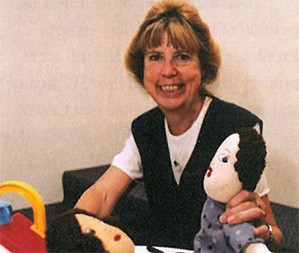
In a state with a high turnover of child welfare workers and a far higher percentage of children of color than case workers of color in the system, dramatic changes are necessary, says Kathleen Coulborn Faller ('71, Ph.D. '81), professor of social work.
Faller says there must be greater emphasis on recruitment and retention, particularly of African American, Latino and Native American professionals. To that end, she and colleagues applied for and recently received a $1 million grant from the federal Children's Bureau- part of the Department of Health and Human Services-to address these issues.
Children of color "are over-represented in the child welfare system," Faller says. "My feeling is, one way to try to impact that is to have more persons of color in the child welfare field."
Over the next five years, Faller and colleagues will develop curriculum materials designed for use by supervisors and managers in the child welfare field. The information will help them learn how to recruit and retain well-trained workers, she says. Both MSW students and doctoral students will be involved in the work, assisting with focus groups and literature reviews. Additionally, students will assist with the development of the curriculum and will participate in the training itself, as well as playing a major role in project evaluation.
One objective of the project is to work closely with the child welfare training staff at the state's Child Welfare Institute so the curriculum materials can integrate with existing training and initiatives, the grant proposal says. The project also will go toward creating technical assistance to the state, such as gathering statistics about the rates at which people leave child welfare jobs and conducting exit interviews with workers who depart.
"We're trying to do what we can to help the system work better," Faller says.
The curricula will go on a website so people nationwide can access it, Faller says.
Faller and her colleagues will collaborate with the Michigan Family Independence Agency (FIA), the state's department of social services, on the development of the curricula. The training will be delivered seven times in various Michigan sites to staff members from the public and private sectors.
The need for qualified child welfare workers in Michigan is particularly acute now because many employees took an early retirement package last year, and currently the state is requiring all departments to trim their budgets. The former resulted in a 20% reduction in the number of staff in PIA because of the retirement of some workers and the promotion of others into the slots of retiring supervisors, the grant proposal says.
Faller says it's important for faculty at U-M to remember that they work for a public institution. "As such," she says, "we need to be mindful of the needs of the people in the state."
The gap needs to be reduced between the number of case workers and the number of children in the child welfare system who are Latinos, says Robert Ortega ('83, Ph.D. '91), associate professor of social work. He points out that the state's Latino population is increasing rapidly, but, he says, "there are not enough workers who are Spanish-speaking and who are familiar with these communities."
"Because we don't have enough workers to enter these communities, we don't know very much," he says. "By becoming familiar with these communities, you gain access to indigenous concerns. Training then becomes relevant because it allows us to incorporate the unique aspects of culture and the experience of being culturally different."
The implications of not having enough well-trained child welfare workers are potentially devastating, says Frank Vandervort, manager of the Michigan Child Welfare Law Resource Center in the Law School, legal consultant for the development of the curricula.
"When you don't have good workers, the legal system can't adequately protect children," he says. "Child welfare workers need to understand what options are available to them, legal and otherwise."
Faller is the principal investigator. Co-principal investigators are John Tropman (Ph.D. '67), professor of nonprofit management and social policy in the School of Social Work and adjunct professor of organizational behavior and human resources in the Business School; Mieko Yoshihama, associate professor of social work; and Ortega.
Others working on this effort are from the University of Oklahoma and the Children's Bureau.
-Katie Gazella is the editor of the U-M faculty and staff publication The University Record. A version of this piece was published originally in the November 17, 2003, issue of The University Record.